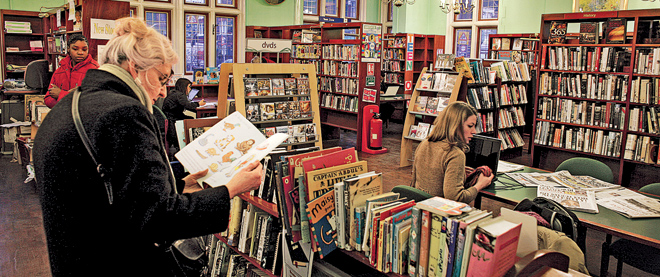Bye to the books
The United Kingdom’s libraries are on the chopping block, but incensed Britons are fighting back
Share

Earlier this month, Lauren Smith, 23, graduated with a masters in librarianship from the University of Sheffield. Her timing could not have been worse. “The idea that anyone can free themselves from ignorance through public libraries is an important one for Britain,” she says. “What’s happening now is hacking away at culture for the everyman.”
The “hacking” Smith refers to is the coalition government’s radical spending cuts, which are expected to culminate in unprecedented public library closures across Britain in the coming months.
As local councils reveal their budgets, it is estimated that up to 800 public libraries—18 per cent of the country’s total—could face closure. At present, almost 400 are already on the chopping block. In Doncaster, a down-at-the-heels former industrial centre in south Yorkshire, 14 of 26 public libraries are slated to close. It is especially grim during recessionary times when, according to Smith, research demonstrates that people use public libraries more. “People say, ‘Why do you need libraries now that everyone has the Internet?’ But actually 30 per cent of British homes don’t have home Internet access at all. Many people come to libraries not just to borrow books but to apply for jobs online.”
Smith is a spokesperson for Save Doncaster Libraries, a community group that has been campaigning against the cuts since early 2010. In the past year they have accumulated over 4,000 petition signatures, held several “ReadIns” designed to draw attention to the plight of public libraries (the former Labour politician Tony Benn addressed a crowd of over 400 late last October), and on Feb. 5 they will participate in a countrywide national day of action.
In Somerset, where 20 of 34 libraries are facing closure, a series of consultative events being billed as the “library closure road show” has recently begun. In Gloucestershire, campaigners recently presented their county government with a 10,000-signature petition to stop cuts slated to close 11 libraries and hack off 43 per cent of the library budget.
Not surprisingly, literary celebrities such as Philip Pullman, Kate Mosse and Man Booker prize winner Hilary Mantel have rallied around the cause. In a recent essay for the Guardian, Joanna Trollope wrote an impassioned argument in support of public lending libraries, imploring, “We’re not talking about saving money here, but saving sanities.” Libraries are seen as a soft target for cuts in a time when all public infrastructure is feeling the pinch. But that hasn’t stopped local residents from coming to the defence of what the Scottish-American philanthropist Andrew Carnegie once called “the cradle of democracy.”
James Powney, Labour councillor for the district of Brent in northwest London, was recently shouted down at a public meeting during which he announced the council would be shutting down six of the borough’s 12 libraries. Constituents there are particularly incensed over the slated closure of the Kensal Rise Library, a neighbourhood favourite located on a residential street in a charming Victorian building and founded by Mark Twain.
“Yes, it’s a nice library in a nice building, but it’s got problems,” says Powney, whose government intends to sell off most of the library buildings they close. “There’s no disabled access to the [second] floor, it’s also well away from the high street so it doesn’t have the foot traffic.” He went on to point out that 82 per cent of his constituents in Brent have never borrowed a book and probably never will. The plan over time, he says, is to have fewer libraries that are bigger, better and more modern in scope. “People say to me, ‘Oh these small libraries—they’re never open and there’s never anything in them.’ The fact is, people need to move on.”
But residents like Kathleen King, 32, are having none of it. A card-carrying member of the Labour Party, she says it’s not enough for local councillors like Powney to blame the Tory-led government’s budget cuts. “Our library really is the centre of this community, and for me, as a mother of young child, the only free thing for my daughter to do in the area,” she said. “I don’t want a brand-spanking-new, all-singing-all-dancing library a 40-minute bus ride away.”
Campaigners say the cuts are happening so fast no one is bothering to look into whether they are actually legal. According to Britain’s Public Libraries and Museums Act of 1964, local authorities have a statutory duty to provide “a comprehensive and efficient public library service.” This duty, Smith and her fellow campaigners argue, is one that is now being shirked by local councils across the land.
But Roy Clare, CEO of the Museums, Libraries & Archives Council, an organization that works with various levels of government to promote best-practice strategies in the public library sector, says that the wording of the act is simply too broad to be interpreted as such, and that the system needed restructuring anyway. “I’m not in favour of wholesale butchery and closure,” he says. “However, some degree of change is necessary. Like it or not, the country is bust and we’ve got to do something about it.”